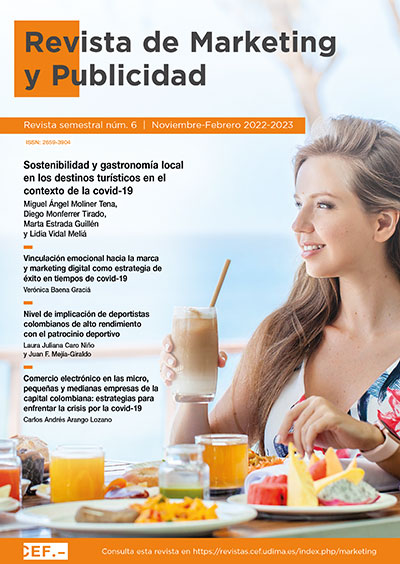Sustainability and local gastronomy in tourist destinations in the context of Covid-19
DOI:
https://doi.org/10.51302/marketing.2022.3493Keywords:
advocacy, Covid-19, local gastronomy, safe experience, satisfaction, service experience, sustainability, tourismAbstract
This study makes an important contribution to the tourism literature by exploring the relationship between sustainability and local gastronomy in tourist destinations within the conceptual framework of transformative services research. In addition, after the Covid-19 pandemic, the safe experience is proposed as a new dimension in the EXQ service experience measurement scale to consider the importance of safety in health. Through a questionnaire to 1,433 tourists, all the hypotheses raised are confirmed, thus verifying the perceived sustainability, the local gastronomy, and the service experience as key aspects in the strategy of any tourist destination. First, the study identifies perceived sustainability as a determining factor in the tourist's service experience at the destination. Tourists consider that sustainability is an intrinsic part of the value proposition of the destination and value the local experience of gastronomy and service through the filter of sustainability. Second, the perception of local gastronomy not only affects the tourist experience but has a decisive influence on perceived sustainability. Finally, the service experience of tourists has a significant positive effect on satisfaction, which in turn positively affects advocacy. The importance of the safe experience in the service experience is also demonstrated, which is a contribution to the tourism literature in the context of Covid-19.
Supporting Agencies
Este trabajo ha sido financiado a través del proyecto AICO/2020/074 de la Generalitat Valenciana (España) para grupos de investigación consolidados
Downloads
References
Antón, C., Camarero, C. y Laguna, M. (2017). Towards a new approach of destination loyalty drivers: Satisfaction, visit intensity and tourist motivations. Current Issues in Tourism, 20(3), 238-260.
Armesto, X. A. y Gómez, B. (2006). Tourism and quality agro-food products: an opportunity for the Spanish countryside. Tijdschrift Voor Economische en Sociale Geografie, 97(2), 166- 177.
Becker, L. y Jaakkola, E. (2020). Customer experience: fundamental premises and implications for research. Journal of the Academy of Marketing Science, 48(4), 630-648.
Björk, P. y Kauppinen, H. (2017). Interested in eating and drinking? How food affects travel satisfaction and the overall holiday experience. Scandinavian Journal of Hospitality and Tourism, 17(1), 9-26.
Blocker, C. P. y Barrios, A. (2015). The transformative value of a service experience. Journal of Service Research, 18(3), 265-283.
Campos, A. C., Mendes, J., Valle, P. O. D. y Scott, N. (2018). Co-creation of tourist experiences: A literature review. Current Issues in Tourism, 21(4), 369-400.
Chen, C. M., Chen, S. H. y Lee, H. T. (2011). The destination competitiveness of Kinmen’s tourism industry: exploring the interrelationships between tourist perceptions, service performance, customer satisfaction and sustainable tourism. Journal of Sustainable Tourism, 19(2), 247- 264.
Cheng, L. y Liu, L. (2022). Exploring posttraumatic growth after the COVID-19 pandemic. Tourism Management, 90, 104474.
Domínguez, J. A. y González, T. (2017). Analysing stakeholders’ perceptions of golf-course-based tourism: A proposal for developing sustainable tourism projects. Tourism Management, 63, 135-143.
Field, J. M., Fotheringham, D., Subramony, M., Gustafsson, A., Ostrom, A. L., Lemon, K. N., Huang, H. H. y McColl, J. R. (2021). Service research priorities: Designing sustainable service ecosystems. Journal of Service Research, 24(4), 462-479.
Fornell, C. y Larcker, D. F. (1981). Structural equation models with unobservable variables and measurement error: Algebra and statistics.
Friedrich, T. L., Byrne, C. L. y Mumford, M. D. (2009). Methodological and theoretical considerations in survey research. The Leadership Quarterly, 20(2), 57-60.
Fullerton, G. (2011). Creating advocates: The roles of satisfaction, trust and commitment. Journal of Retailing and Consumer Services, 18(1), 92-100.
Galeone, A. y Sebastiani, R. (2021). Transformative service research in hospitality. Tourism Management, 87, 104366.
Green, G. P. y Dougherty, M. L. (2008). Localizing linkages for food and tourism: Culinary tourism as a community development strategy. Community Development, 39(3), 148-158.
Hair, J. F., Black, W. C., Babin, B. J. y Anderson, R. E. (2010). Canonical correlation: A supplement to multivariate data analysis. En Multivariate Data Analysis: A Global Perspective. (7.ª ed.). Pearson Prentice Hall Publishing.
Hanna, P., Font, X., Scarles, C., Weeden, C. y Harrison, C. (2018). Tourist destination marketing: From sustainability myopia to memorable experiences. Journal of Destination Marketing & Management, 9, 36-43.
He, X., Cheng, J., Swanson, S. R., Su, L. y Hu, D. (2022). The effect of destination employee service quality on tourist environmentally responsible behavior: A moderated mediation model incorporating environmental commitment, destination social responsibility and motive attributions. Tourism Management, 90, 104470, 1-14.
Hill, S., Provost, F. y Volinsky, C. (2006). Network-based marketing: Identifying likely adopters via consumer networks. Statistical Science, 21(2), 256-276.
Jang, S., Kim, B. y Lee, S. (2022). Impact of corporate social (ir)responsibility on volume and valence of online employee reviews: Evidence from the tourism and hospitality industry. Tourism Management, 91, 104501, 1-11.
Jöreskog, K.G. y Sörbom, D. (1993). LISREL 8: Structural equation modeling with the SIMPLIS command language. Scientific Software International.
Kim, Y. G. y Eves, A. (2012). Construction and validation of a scale to measure tourist motivation to consume local food. Tourism Management, 33(6), 1458-1467.
Kim, Y. H., Kim, M., Goh, B. K. y Antun, J. M. (2011). The role of money: The impact on food tourists’ satisfaction and intention to revisit food events. Journal of Culinary Science & Technology, 9(2), 85-98.
Kivela, J. y Crotts, J. C. (2005). Gastronomy tourism: A meaningful travelmarket segment. Journal of Culinary Science & Technology, 4(2/3), 39-55.
Klaus, P., Edvardsson, B. y Maklan, S. (2012). Developing a typology of customer experience management practice - from preservers to vanguards. En 12th International Research Conference in Service Management. La Londe les Maures.
Lee, J. S., Hsu, L. T., Han, H. y Kim, Y. (2010). Understanding how consumers view green hotels: how a hotel’s green image can influence behavioural intentions. Journal of Sustainable Tourism, 18(7), 901-914.
Lemon, K. N. y Verhoef, P. C. (2016). Understanding customer experience throughout the customer journey. Journal of Marketing, 80(6), 69-96.
Lin, L. P. L. y Hsieh, W. K. (2022). Exploring how perceived resilience and restoration affected the wellbeing of Matsu pilgrims during COVID-19. Tourism Management, 90, 104473, 1-8.
Liu, C. H., Horng, J. S., Chou, S. F., Chen, Y. C., Lin, Y. C. y Zhu, Y. Q. (2016). An empirical examination of the form of relationship between sustainable tourism experiences and satisfaction. Asia Pacific Journal of Tourism Research, 21(7), 717-740.
MacKenzie, S. B. y Podsakoff, P. M. (2012). Common method bias in marketing: Causes, mechanisms, and procedural remedies. Journal of Retailing, 88(4), 542-555.
Maklan, S. y Klaus, P. (2011). Customer experience: are we measuring the right things? International Journal of Market Research, 3(6), 771-772.
Moliner, M. A., Monferrer, D. y Estrada, M. (2019). Customer engagement, non-transactional behaviors and experience in services: A study in the bank sector. International Journal of Bank Marketing, 37(3), 730-754.
OMT. (2022). Tourism and COVID-19: Guiding tourism’s recovery. https://www.unwto.org/es/turismo-covid-19
Podsakoff, P. M., MacKenzie, S. B., Lee, J. Y. y Podsakoff, N. P. (2003). Common method biases in behavioral research: a critical review of the literature and recommended remedies. Journal of Applied Psychology, 88(5), 879.
Richards, G. (2003). Gastronomy: an essential ingredient in tourism production and consumption? En Tourism and Gastronomy (pp. 17-34). Routledge.
Sánchez, R., Iniesta, M. Á. y Cervera, A. (2019). Exploring the concept of perceived sustainability at tourist destinations: A market segmentation approach. Journal of Travel & Tourism Marketing, 36(2), 176-190.
Shin, H., Nicolau, J. L., Kang, J., Sharma, A. y Lee, H. (2022). Travel decision determinants during and after COVID-19: The role of tourist trust, travel constraints, and attitudinal factors. Tourism Management, 88, 104428.
Sims, R. (2009). Food, place and authenticity: local food and the sustainable tourism experience. Journal of Sustainable Tourism, 17(3), 321-336.
Smit, B. y Melissen, F. (2018). Sustainable customer experience design: Co-creating experiences in events, tourism and hospitality. Routledge.
Smith, S. y Costello, C. (2009). Culinary tourism: Satisfaction with a culinary event utilizing importance-performance grid analysis. Journal of Vacation Marketing, 15(2), 99-110.
Steenkamp, J. B. E. y Van Trijp, H. C. (1991). The use of LISREL in validating marketing constructs. International Journal of Research in Marketing, 8(4), 283-299.
Stokburger-Sauer, N., Ratneshwar, S., y Sen, S. (2012). Drivers of consumer–brand identification. International Journal of Research in Marketing, 29(4), 406-418.
Suárez, M., Rubio, J. C., Pinto, J. y Gemar, G. (2018). A model to measure sustainable development in the hotel industry: A comparative study. Corporate Social Responsibility and Environmental Management, 25(5), 722-732.
Sun, W., Chen, W. T., Zhang, Q., Ma, S., Huang, F., Zhang, L. y Lu, H. (2021). Post-traumatic growth experiences among COVID-19 confirmed cases in China: A qualitative study. Clinical Nursing Research, 30(7), 1.079-1.087.
Torres, R. (2002). Toward a better understanding of tourism and agriculture linkages in the Yucatan: Tourist food consumption and preferences. Tourism Geographies, 4(3), 282-306.
Torres, A. y Palomeque, F. L. (2014). Measuring sustainable tourism at the municipal level. Annals of Tourism Research, 49, 122-137.
Vargo, S. L. y Lusch, R. F. (2008). Service-dominant logic: continuing the evolution. Journal of the Academy of Marketing Science, 36(1), 1-10.
Xu, Y. y Zeng, G. (2022). Not eating is a loss: How familiarity influences local food consumption. Tourism Management, 90, 104479.
Yoon, Y. y Uysal, M. (2005). An examination of the effects of motivation and satisfaction on destination loyalty: a structural model. Tourism Management, 26(1), 45-56.
Downloads
Published
How to Cite
Issue
Section
License
Copyright (c) 2022 Miguel Ángel Moliner Tena, Diego Monferrer Tirado, Marta Estrada Guillén, Lidia Vidal Meliá

This work is licensed under a Creative Commons Attribution-NonCommercial-NoDerivatives 4.0 International License.





















